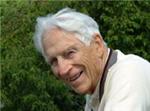
HUU Sermon Archives
Happiness Is?
By James Geary
Presented November 12, 2006
READING:
 The
following are quotes from Ralph Waldo Emerson’s essay on compensation.
The
following are quotes from Ralph Waldo Emerson’s essay on compensation.
Human labor, through all its forms, from the sharpening of a stake to the construction of a city or an epic, is one immense illustration of the perfect compensation of the universe, the absolute balance of Give and Take.
Polarity, or action and reaction, we meet in every part of nature; in darkness and light; in heat and cold; in the ebb and flow of waters; in male and female. An inevitable duality bisects nature, so that each thing is a half, and suggests another thing to make it whole; as, spirit, matter; man, woman; odd, even; subjective, objective; in, out; upper, under; motion, rest; yea, nay.
Nature hates monopolies and exceptions. The waves of the sea do not more speedily seek a level from their loftiest tossing than the varieties of condition tend to equalize themselves. There is always some leveling circumstance that puts down the overbearing, the strong, the rich, the fortunate, substantially on the same ground with all others.
Men seek to be great; they would have offices, wealth, power, and fame. They think that to be great is to possess one side of nature — the sweet — without the other side, the bitter. This dividing and detaching is steadily counteracted. We can no more halve things and get the sensual good, by itself, than we can get an inside that shall have no outside, or a light without a shadow
As no man had ever a point of pride that was not injurious to him, so no man had ever a defect that was not somewhere made useful to him.
The dice of God are always loaded. Every secret is told, every crime is punished, every virtue is rewarded, in silence and certainty.
Talk: Happiness Is?
On a small bulletin board on the wall at the back of my desk in my study, I have a picture of my two-year-old great grandson, Taz. His mother, my granddaughter Virginia, emailed me the photograph from Boulder, CO, where she lives with her husband, Matt. I have never seen Taz in person. And he has only about an eighth of his inheritance, his genes, from me.
Nevertheless, Taz would not be Taz if it were not for me, and if it were not for the infinitely long lines of ancestors that led to me, and to him. Therefore, that picture reminds me of the endless, mysterious stream of life, the magical stream of life that we are all a part of. For me, all other mysteries, all other miracles pale beside that.
My talk this morning is going to be about life, about life and about justice. It is also going to be about the pursuit of happiness. This talk is very important to me, because it embodies my most deeply felt philosophy of living. It defines, more than anything else, who I am.
It is something of a re-write of a talk entitled A Philosophy of a Lifetime that I made to this fellowship in March of 1992, 14 ½ years ago. Not many of you were members or friends then. From time to time, I will have quotes from those talks. But to speed things up, I will not necessarily identify them as quotes. - - - The Dali Lama says the purpose of life is to be happy. I think that rings a bell with most of us. But you will note I did not say one aspect of this talk was going to be about happiness, but rather the pursuit of happiness. Because happiness is sort of a will-o-the-wisp. And the definition of will-o-the-wisp is: a delusive or elusive goal. I think happiness is both elusive and delusive. We never seem to quite get there. There may not be any such thing.
Oh, we have good feelings. And sometimes they last for a while. And sometimes they are fleeting. And we have bad feelings, and sometimes they are fleeting, and sometimes they last too long. And so this talk is also about the relationship between good feeling and bad feeling, and I will call them by their familiar names, happiness and unhappiness.
You know, in some ways these are the best of times. There are so many things these days, so many processes in our affluent and abundant society that are designed to make us feel good, to make us happy, if you will. There are so many gadgets, so many labor saving devices, to make life easier, or to amuse us; so many opportunities for relaxation, for vacationing, for travel. You would think we would be happy.
But in some ways these are the worst of times. There are wars and rumors of wars. And who knows how they might engulf the world, including our world. There is uncertainty and even fear about the economy. There is a widespread feeling that in our society morality is slipping, and as always there is worry about the younger generation. There is fear of the power of government interfering with our private lives. There is fear of terrorism. And in the back of our minds there is that dark shadow, the potential for the human race to eliminate itself from the planet.
And so we are confused. We can’t quite attain the happiness that the Dali Lama says is the purpose of life We come here seeking what we call spirituality, without quite knowing what it is. - - - I don’t have an answer for you. I only have a suggestion, a philosophy, a way of thinking, that has stood me in good stead since I was a teenager. It is a philosophy, a deeply held conviction that has helped me though the ups and downs of a long and full life. To quote from my earlier talk: I believe it is a philosophy which has the potential to make your life calmer, to give you more of a feeling of security, to lessen your fears, to give you more courage to face the future whatever it brings.
This morning I will try to bring you that message of hope. Although I am not sure hope is the right word. It is not hope for salvation in an afterlife, not hope for another existence in this world or another world, or in another dimension. Rather it is a philosophy of living — living in this world. That is what Buddhism is about, although my personal philosophy predates my interest in Buddhism by most of my life.
To get to the heart of it. I have a sincere and deeply felt conviction that human emotions are balanced, that there is a natural law of compensation in human affairs.
What does that mean? It means that there is a balance between good feeling and bad feeling. It means that pleasure and pain are opposite sides of the same coin, the one dependent on the other, and are equal.
I know you don’t believe that, certainly not to the extent that I do, at any rate. But I hope you will consider it with an open mind and give it an honest try. Take a chance on having a calmer, less stressful life.
This is not a religious concept. It doesn’t require some supernatural being. It is a conviction based on science. But it is not strictly scientific because it is not a theory that can be tested scientifically. Any effort to show examples, to relate experiences to support the theory would be strictly subjective. There is no scale by which to measure good feeling and bad feeling.
You may ask of me "How can you say that a poor man or woman, a deprived child, has the same balance of pleasure and pain, happiness and unhappiness, hope and fear, that a rich man or woman has, or a privileged child. And I will answer you that I cannot possibly quantify these emotions, even for myself. Nevertheless, that is exactly what I believe.
I take it on faith, on the basis of observation, on my own experience. I believe it because I don’t see how it could be any other way. You can’t make something out of nothing. Happiness cannot come from nothing. Pain cannot come from nothing. The one creates the other.
We know from high school physics that for every action there is an equal and opposite reaction. We know that time and space are sacrificed for power, and vice versa. In nature nothing is lost, energy becomes matter, matter becomes energy. There is never something out of nothing; and something never becomes nothing.
Let me explain, if I can, what I mean by pleasure and pain, happiness and unhappiness. I don’t mean that if you are ecstatic in the morning you will necessarily be deeply depressed in the afternoon. I don’t say that highs will always be balanced immediately by equal lows, or vice versa. Sometimes highs and lows are so minimal that we don’t recognize them as such.
I regard boredom, ennui, as pain. It is a low grade of pain, but pain nevertheless. A long period of boredom, or of mild difficulty, or of annoying frustration, might be balanced by a short period of soaring good feeling --- such as a mountain climber might feel on reaching the top after a long and arduous struggle up the mountain. The climber has a rush of good feeling that balances out the low grade pain of the long climb. For the moment he or she is happy.
Likewise I regard a mild good feeling, the pleasure of a good book, or a soft breeze on your cheek, as happiness. Happiness doesn’t have to be soaring; it can be low key, mild, hardly noticeable as happiness. But if it goes on for some time it amounts to quite a bit of pleasure, of good feeling. And it can be balanced by a sharp rush of pain or unhappiness. Or it might be balanced by an extended period of low grade bad feeling.
Hopeful anticipation is a pleasure; it is happiness. Disappointment is pain; it is unhappiness. One might say; "I could see the pain in her face." You could say that of someone who has lost an athletic contest, or a spelling bee. He or she is in pain; they are unhappy. And the more confident the pleasurable anticipation of winning, the greater the pain on losing. You could say that about an election. It is a question of balance; of compensation.
Say we are sick or have had an operation. The pain and uncertainty of a long recuperation is balanced by the hope of recovery, the pleasure of progress, the anticipation of being well. I have noticed that after an extended illness, a week or two, or more, upon becoming well I have a wonderful feeling of joy. It is so good to feel whole again, so good to be alive.
Are any of us so naive as to think the rich are happier than the rest of us. Of course we know they are not. We know in our hearts that behind the walls of their great houses there are many kinds of pain, many disappointments, many frustrations, self doubt, personal loss, fear, despair. They pay for their leisure, their comfort, their fine possessions, as Emerson stated so well when he wrote: “There is always some leveling circumstance that puts down the overbearing, the strong, the rich, the fortunate, substantially on the same ground with all others.” - - - I said this talk, in part, was going to be about justice. I believe this compensation in human emotions is the justice that we all wish for in human society. All religions promise, in their various ways, an ultimate justice. I believe this is that ultimate justice.
Let me ask you, if pleasure and pain, happiness and unhappiness, are equal; is that not justice? We weren’t promised a bowl of cherries, a bed of roses. All we have is life, is feeling, If our good feelings and bad feelings are balanced, is that not justice? - - -
All right, so what is hopeful, what is helpful in this philosophy of mine. What in this view leads to more of a sense of calmness, a more secure feeling, a lessening of fear?
I believe this view, this philosophy, if you truly embrace it, and can believe it, will smooth out the peaks and valleys of your emotions. Your highs may not be as high, but your lows will be more bearable. Your moments of joy may be compromised somewhat by the knowledge that you will pay for them. But your depressions will not be as deep, because you will know that sooner or later the reaction will set in, the balance will be achieved.
Thus you will feel more secure, have less fear of the future, because you will know that whatever the future brings, there will be a balance in your emotions, in pleasure and pain, in hope and fear. I believe this is an aspect of what the ancient Greek philosophers taught, the middle way, moderation in all things. That is what the Buddha taught.
With this philosophy, you realize that the pursuit of happiness, a search for a sort of permanent good feeling that can be built up, like money in the bank, is a chase after a will-o-the-wisp. There is no such thing. The bank account is fluid. It is constantly fluctuating between surplus and deficit, between good feeling and bad feeling,.
Life is an adventure. It is interesting, but it exacts its price. You cannot create something out of nothing. Emotions are relative. Pain and pleasure are opposite sides of the same coin. You can’t have the one without the other.
With this philosophy one realizes, all over again, what one has always known, that everything has its price, that in human emotions, just as in the practical everyday world of human affairs, there is no free lunch. One simply has to learn to accept the price. One simply has to learn to accept the price.
Read more sermons or talks by Jim Geary.
Return to Sermon Archives
For the latest sermons and events at HUU, visit our Community Cafe.
Inclement
Weather Policy
Worship
Service Materials


UUs on YouTube
Our denomination has an official presence on YouTube! The Unitarian Universalist Association's YouTube site includes several videos and lots of interesting commentary.
Harrisonburg Unitarian Universalists 4101 Rawley Pike | Harrisonburg,
VA 22801
Mailing Address: | PO Box 96 | Harrisonburg, VA 22803
| (540) 867-0073 | Webmaster
HUU is a member of the Southern
Region of the Unitarian Universalist
Association
Privacy Policy &
Disclaimer
Site Design & Maintainence : Expression
Web Tutorials & Templates


